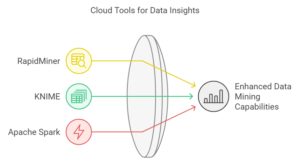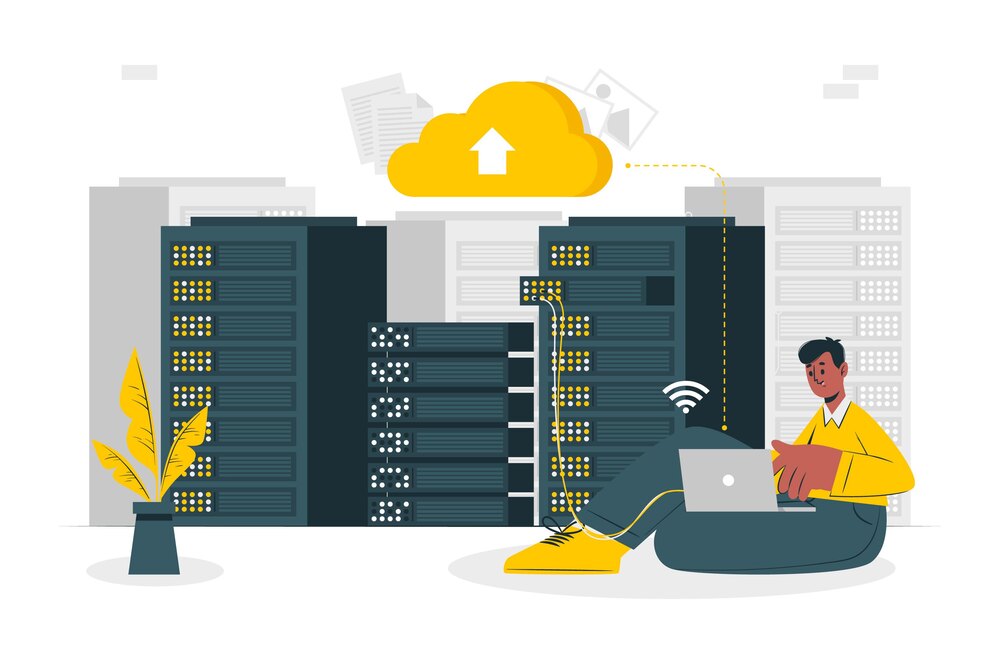
Explore the synergy of Cloud Computing and Data Analytics to drive smarter decisions and propel business growth effectively.
Businesses are increasingly turning to cloud computing and data analytics to gain a competitive edge. By leveraging the power of the cloud, companies can store, process, and analyze vast amounts of data in real time, uncovering valuable insights that drive informed decision-making. This blog explores how the synergy between cloud computing and data analytics is unlocking new business opportunities and transforming the way organizations operate.
The Importance of Cloud Computing
Cloud computing helps companies change quickly with market and consumer needs. This tech makes it easier for businesses to use resources and be more agile.
Benefits of Cloud Computing for Businesses
Cloud computing offers many benefits. Companies enjoy better teamwork, save money, improve data security, and can grow easily. A Flexera report shows that 94% of businesses use cloud services, and half of their work is on the cloud. The main perks are:
- Scalability: Adjust resources as demand goes up or down.
- Cost Savings: Spend less on IT than traditional setups.
- Enhanced Collaboration: Teams can work together in real-time.
- Improved Data Security: Cloud providers offer strong security features.
Key Players in the Cloud Computing Space
Some big names lead the cloud computing market. The top choices are Amazon Web Services (AWS), Microsoft Azure, and Google Cloud. These companies keep improving their services, helping businesses work smoother. Their competition leads to more innovations and better prices, helping companies succeed.
Understanding Data Analytics and Its Role in Business Growth
Data analytics is vital for businesses looking to grow. It helps them understand data and use it to drive growth. Companies can look back, foresee the future, and plan actions through descriptive, predictive, and prescriptive analytics. Reports show that businesses using data analytics can perform better. They acquire and keep more customers than their competitors.

Types of Data Analytics: Descriptive, Predictive, and Prescriptive
The three main types of data analytics aid business strategies in different ways:
- Descriptive Analytics: This looks at past data to find trends and patterns. It helps understand what happened.
- Predictive Analytics: It uses models and machine learning to predict future events from past data. This helps anticipate customer behavior and market trends.
- Prescriptive Analytics: This suggests actions to achieve goals. It merges insights from descriptive and predictive analytics for decision-making.
How Data Analytics Enhances Decision-Making
Data-driven insights are crucial for making good decisions. With data analytics, companies can:
- Spot trends to guide strategies.
- Allocate resources efficiently to optimize operations.
- Improve customer service with personalization.
The importance of data analytics in business growth is growing. Organizations that use insights to make informed actions gain a competitive edge. They become more profitable and stay ahead of the competition.
Cloud Computing and Data Analytics: A Powerful Synergy
Cloud computing and data analytics work together to help businesses grow. Cloud solutions handle big data, making it easier for companies to understand and use their information. This helps them make smart choices quickly.
One key benefit is getting to data fast and working on it right away. Cloud platforms make this possible, leading to better analysis and quick responses to changes. An IBM study found that using cloud analytics cuts data prep time by 80%. This means companies can act on data faster, making their operations more nimble.
This powerful mix is great for using big data. It lets businesses scale up using the cloud, and data analytics tools give deep insights. This way, companies can improve their services, make customers happy, and grow.
| Aspect | Cloud Computing Benefits | Data Analytics Contributions | Synergy Effects |
| Scalability | Dynamic resource allocation | Advanced analytical capabilities | Supports growing business needs |
| Access | Real-time data availability | Instant insights generation | Informed decision-making |
| Efficiency | Reduced infrastructure costs | Streamlined data processing | Faster operations |
| Flexibility | Adaptable to market changes | Comprehensive data analysis | Enhanced agility |
Big Data: Transforming Business Operations and Strategies
Big Data marks a major shift in how organizations deal with info. It features high volume, velocity, and variety, surpassing what traditional software can handle. This allows companies to personalize customer experiences and enhance operations.
What is Big Data?
Big Data involves huge, complex datasets that need advanced processing and analysis tools. Its key traits include:
- Volume: The massive amount of data from different sources.
- Velocity: The quick rate at which data is generated and processed.
- Variety: The diverse forms of data collected, from structured to unstructured.
By adopting a strong Data Strategy, organizations can tap into big data. They can improve operational efficiency by 29%. This boosts informed decision-making and competitiveness.
The Role of Big Data in Cloud Computing Solutions
Big data and Cloud Computing have changed information management. Cloud platforms offer the infrastructure needed for big datasets. For example, tools like Amazon Redshift help with seamless data warehousing and analytics.
Big data’s benefits in cloud environments include:
- Scalability: Cloud computing allows data to scale flexibly.
- Cost Efficiency: Cloud services cut traditional data management costs.
- Accessibility: Insights are accessible anywhere, aiding team collaboration.
Big data and cloud computing together help businesses to create powerful Data Strategies. This leads to better operations and sparks innovation.
Machine Learning and Artificial Intelligence in Data Analytics
Machine Learning and Artificial Intelligence have changed how businesses work and decide. These technologies process lots of data to find patterns. This helps organizations predict future trends better. By using Smarter Analytics, companies increase efficiency and accuracy in their work.
Integrating Machine Learning for Smarter Analytics
Businesses gain deeper insights by using machine learning models. These algorithms learn from data to get better over time. They handle complex tasks faster than people can, boosting productivity. Key uses include predictive maintenance, fraud detection, and personalized marketing.
- Predictive maintenance in manufacturing
- Fraud detection in financial services
- Personalized marketing strategies in retail
The Impact of AI on Business Operations and Consumer Insights
AI makes business tasks smoother and offers deep insights. Companies are spending more on AI to enhance customer service. For instance, Netflix uses AI to suggest shows based on what you watch. This improves viewers’ happiness and keeps them coming back.
Data Mining Techniques for Enhanced Business Insights
Data mining is key for pulling valuable info from big datasets. It helps businesses see patterns and make smart choices. Industries like retail and finance use it for better marketing, finding fraud, and getting insights. A Gartner report shows many organizations need more skilled people for effective data mining.
Understanding Data Mining and Its Applications
Data mining examines complex data for hidden trends. It’s used in retail to target customers better and in finance to decrease risks. For instance, stores look at what people buy to plan their marketing. Banks use it to spot strange transactions. These findings help firms make choices based on data, leading to improved results.

Key Tools for Data Mining in Cloud Environments
Today, cloud environments offer powerful tools for data mining. Some key ones include:
- RapidMiner: It’s an all-in-one platform for data prep, machine learning, and analytics.
- KNIME: This open-source tool is great for data analytics and report-making from various sources.
- Apache Spark: Known for fast processing of big data, it’s perfect for real-time mining tasks.
These tools boost the ability to mine data in the cloud. They help businesses do analytics on a big scale. By using data mining, companies can find important insights. This leads to better decisions and growth.
Data Visualization Tools: Making Sense of Complex Data
Data Visualization turns complex data into clear visuals. Tools like Tableau and Power BI help businesses see important trends hidden in big datasets. These tools make it easier to understand data and make smart decisions quickly.
A study by Nielsen Norman Group found that visuals make things 400% clearer. This shows how crucial good data visualization is today. With the right tools, companies can find key insights to guide their strategy.
The following table lists some popular Data Visualization tools and their key features. These features show how they help manage complex data.
| Tool | Key Features | Best For |
| Tableau | Interactive dashboards, real-time data analytics, drag-and-drop interface | Advanced data analytics and visualization |
| Power BI | Comprehensive integration with Microsoft products, natural language query, cloud-based sharing | Users familiar with Microsoft applications |
| QlikView | Associative data modeling, self-service capabilities, advanced analytics | Businesses that require quick performance |
| Google Data Studio | Free to use, seamless integration with other Google services, easy sharing | Organizations with budget constraints |
Choosing the right Data Visualization tool is key for businesses. It helps them understand their data better and make informed decisions. By knowing the strengths of different tools, businesses can find the perfect fit for their needs.
Data Warehousing Solutions for Better Data Management
Data warehousing serves as a central hub for storing large amounts of data from various sources. It’s critical for businesses that want to bring together their data to boost analysis. Cloud-based solutions offer powerful tools for efficient data management.
What is Data Warehousing?
Data warehousing is about collecting and handling data from different places to help businesses understand their operations better. It makes data easy to find and study. This gives companies a clear view of their information, helping them make choices based on past trends.
Benefits of Cloud Data Warehousing
Using the cloud for data warehousing brings many benefits for managing data better. Here are some important ones:
- Lower maintenance costs due to reduced infrastructure requirements.
- Improved accessibility, as data can be accessed from anywhere with an internet connection.
- Enhanced security features that protect sensitive data from unauthorized access.
- Scalability, allows businesses to easily adjust their storage capabilities as their data needs grow.
- Integration with various analytics tools for comprehensive analysis.
Cloud solutions like Amazon Redshift and Google BigQuery show how clouds can improve data warehousing. A Forrester study found that companies save up to 30% in costs with cloud data warehouses compared to traditional ones.
Conclusion
The mix of Cloud Computing and Data Analytics is key. Businesses that use these technologies make better choices. They grow by making decisions based on data, improving how they work and how happy customers are.
Cloud services can be adjusted to meet different needs. This means companies of any size can use advanced tools for analyzing data without spending a lot on tech. It opens doors for smaller businesses to stand toe-to-toe with big companies. This makes it essential to use Cloud Computing and Data Analytics to stay ahead in a market that’s all about data.
Companies that use these technologies together tend to succeed over time. They focus on making choices based on data and being innovative. This approach sets them up for growth in the future. Staying updated and adaptable is crucial for businesses today. Getting into Cloud Computing and Data Analytics is a must for those looking ahead.
Ready to innovate and transform your business? Say hello to CodeBeavers!
If you are looking for ways to bring your product or app ideas to life? We’ve got your back. CodeBeavers has the tools and engineers you need to make your projects come alive. With CodeBeavers, you’ll be able to build faster than ever, deploy code with ease, and scale like never before. Send us your requirements now, and let’s start winning together.




